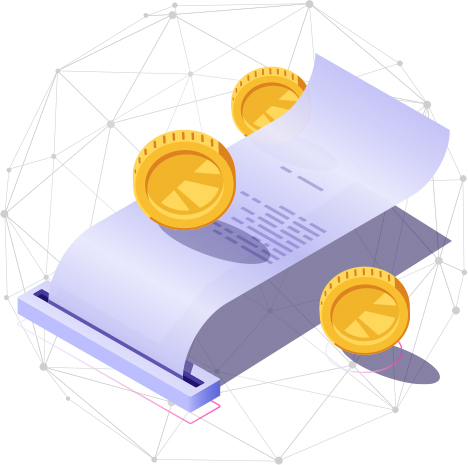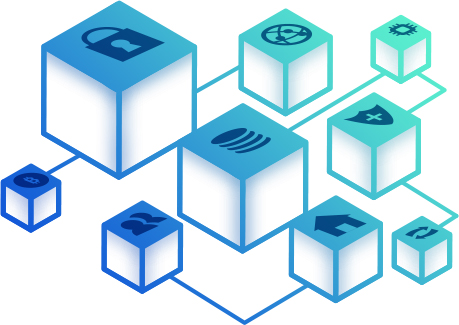The Future of Blockchain Technology: Five Predictions for 2025 (Part 1)
7 min readBlockchain, the term that was initially synonymous with “Bitcoin” has grown by leaps and bounds. In essence, the Blockchain is a growing list of records, also known as blocks, which are linked using the concept of cryptography.
Almost a decade old, the technology has been gaining momentum since its inception. Today, it’s safe to say that Blockchain technology has completely overhauled some of the most intensive operations, like Banking, Insurance, Healthcare, and many more.
But that is the story so far. Let’s pause for a while and reflect on what might be.
In this two-part series, we’ll be looking at 5 predictions for 2025, and how the technology will grow and expand to different verticals:
Prediction # 1: Cryptocurrency for Government

While the US, Spain, China, and a few other countries are actively supporting and adopting cryptocurrencies, we’re sure that by 2025, it’ll be a regular component for any country’s major operations.
From what it looks like, by 2025 most governments would have created or adopted some or the other form of virtual currency. Compared to traditional fiat alternatives, cryptocurrency is a lot more efficient, and provides reduced settlement times, all the while offering increased traceability. Cryptocurrency can also be backed by real assets, and its price can be artificially fine-tuned using numerous controls - like the monetary policy for “printing” more tokens.
In the shorter term, government-based cryptocurrency is going to become an area of exploration and experimentation, and will mostly be led by developing nations with weak institutions and unstable economies. Many of such efforts might come in a hasty fashion - with a timeline driven not by economic issues but political concerns. For instance, consider the Zimbabwe dollar, that suffered staggering inflation of 500,000,000,000%.
In the long run, however, successful cases will definitely emerge. Next-gen Blockchain technology will put many present-day limitations to rest, especially the likes of scalability, privacy controls, toolset maturity, and interoperability. Price-stable tokens regulated by monetary policies and backed by collateral will start to gain a lot more traction, as with time they’ll become more reliable and a means of storing and exchanging value. Governments that have failed to create a successful cryptocurrency but then are likely to turn to “stable coins” as their virtual currency.
Prediction #2: Trillion-Dollar Tokens

By 2025, there will be more trillion-dollar tokens than there will be trillion-dollar companies.
There is an ongoing race between the big four companies of the world (based on stock market valuation), as to which will be the first to reach a trillion dollars in value. Apple, Microsoft, Amazon, and Alphabet (Google) are all in a race to the “four-comma club”.
These companies, in all honesty, are representative of the new economy. One that is based on the decades-long transition to digital businesses and online connectivity. It is the internet economy, or according to the Blockchain promoters, “Web 2.0” - as the next era, the Blockchain era, will be “Web 3.0”.
This old economy is analog, brick and mortar, based on the manufacturing of raw materials, cultivation of foodstuffs, or on the transportation and sale through physical channels. Obviously, all of these things still matter, but their economic role has rapidly declined in the grand scheme of things.
The next era is emerging and is likely to follow a completely different pattern than previous economic transformation waves. What the previous economic transformations worked on was a predicted notion of a company. In business, there is a long-standing notion of the theory of the firm, as articulated by Ronadl Coase. It seeks to address the following questions: Why do firms exist? Why do they grow? How are they structured? Etc.
According to us, looking at a company is quite like looking at a single-cell organism and observing its internal subsystems, and a semi-permeable membrane that permits the flow of certain substances across the boundary. Coase says that firms exist because the cost of business processes or transactions inside the membrane is much lower than the price involved in crossing the border. Other transactions and processes must cross the boundary (to work with other entities), but a few functions naturally gravitate inside the walls of the organization (or organism, as per our analogy).
Blockchain technology has the potential to completely revolutionize the nature of this equation by dramatically reducing the transactional and information flow costs. The levels of friction and impedance are lowered, which erodes traditional rationale for a firm - especially a trillion-dollar firm. Large firms exist, mostly, because there is a massive schism between processes that occur inside the wall versus those that cross to the outside. Blockchain technology completely changes the equation and promotes frictionless flows of digital assets including tokens.
What this essentially means, is that in future, the trillion-dollar firms will be replaced by trillion-dollar tokens - tokens that are capable of supporting a decentralized ecosystem of entities that satisfy the role of the mega-corporation. We are in the downfall of one era, and there will be more trillion-dollar tokens in less than a decade than there will be trillion-dollar firms.
Prediction #3: Blockchain Identity for all

By 2025, a cross-border, blockchain-based, self-sovereign identity standard will start emerging for not individuals, but also physical and virtual assets.
If e-mail proved to be the breakthrough application for the internet, identity solutions would be the same for Blockchain. Identity systems of today are not only highly dysfunctional, but also insecure, and most of them operate in silos.
Blockchain-based identity systems, on the other hand, will be able to provide a single source of verification for everybody’s identity and assets. By decentralizing data collection, these systems will cross-verifying the information extremely easily. Then, this information will be stored on a decentralized immutable ledger. This will drastically reduce the risk of security breaches and significantly improve the efficiency, reliability, and self-sovereignty.
According to a number of researches, almost 1.5Bn people in our developing world lack proof of identity, with more than 65Mn refugees. Blockchain-based identity platforms will provide such a population with tools and techniques to obtain and maintain legal documentation. Such a platform will be extremely secure and reliable as it will be stored on a distributed ledger, and not in possession of a central authority.
Such an identity platform will also enable self-sovereignty, or in simple terms, the privacy of an individual. The decision of whether or not to disclose one’s identity will be within the individual’s control. With the recent, infamous Facebook data-leakage scandal having wounded the world, Blockchain-based identity systems will surely heal.
Some of the use cases for the types of data stored on such an identity platform include, but are not limited to:
- Government records (ex, DOB),
- Reputation and trust score (ex, credit score),
- Certifications, qualifications, and attestations (ex, a degree/diploma)
- Medical records,
- Employment records,
- Tax records, and more.
To add to this, a blockchain-based platform will be capable of collecting, storing, and sharing data from not only virtual but also physical assets. More than 20Bn IoT devices are predicted to exist in just two more years. From a smart refrigerator to the engine of an airplane, these smart chips are already pervasive. These devices are always connected to the internet - collecting, storing, and transporting data incessantly.
Blockchain will provide a secure, reliable, and effective technique for these devices to transact and communicate with each other. Blockchain keeps an immutable record of all the transactions, thereby enabling instantaneous payment settlements.
Even virtual assets will have a unique identity on Blockchain. As an example, consider crypto kitties - fictional cats that exist in a virtual game and live on the Ethereum blockchain. By the power of Blockchain, these virtual assets will turn into tokenized objects, which, similar to physical assets, will have a unique identity.
Concluding thoughts…
What we discussed was how the future of Blockchain looks. And dare we say, it looks extremely promising. While the above-discussed are just three points, the list doesn’t end here. Come over to the second part of this series, and find out two more predictions that, if true, will make the world realize the true potential of Blockchain.


